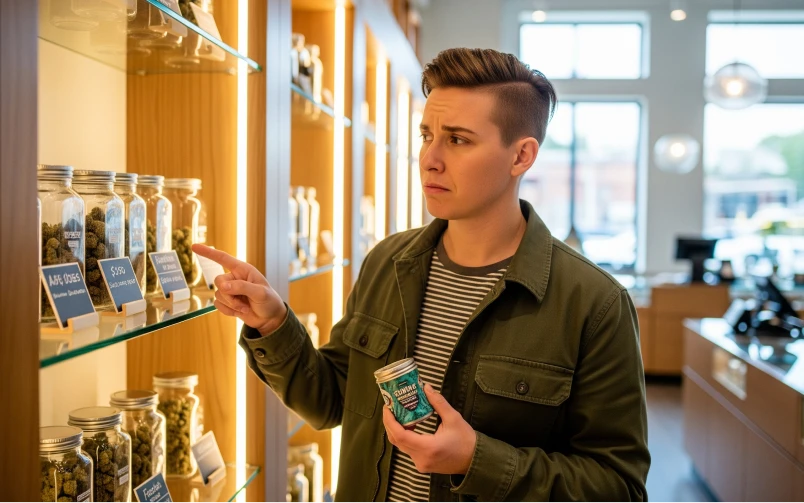Higher Taxes, Lower Sales: California’s Cannabis Crisis


On July 1, 2025, California officially increased its state cannabis excise tax from 15% to 19%, marking a 26% effective increase in the tax rate. This change stems from Assembly Bill 195 (2022), which eliminated the cultivation tax but mandated automatic adjustments to the excise tax to offset lost revenue.
The California Department of Tax and Fee Administration (CDTFA) has affirmed that the new 19% rate applies to all retail gross receipts of cannabis sales starting July 2025, with sales reported in that quarter or month subject to the updated rate.
State analysts estimate this bump could generate around $180 million annually, providing a financial buffer for programs funded by cannabis tax revenue.
Why the Tax Was Raised
The cultivation tax imposed at wholesale was removed to ease the burden on legal operators. In order to maintain revenue neutrality, the law required increasing the excise tax mid-decade if revenues fell short of prior collections from the cultivation tax. Lawmakers called this adjustment “revenue insurance,” meant to protect earmarked programs like youth prevention, environmental cleanup, and public safety without dipping into the general fund.
However, many in the industry argue that raising taxes when revenues are already contracting sets off a destabilizing cycle rather than stabilizing revenue.
Legal Sales Vs. The Black Market
The legal cannabis market in California is in sharp decline:
- Since its 2021 peak, legal sales have dropped roughly 30% statewide.
- In Q1 2025, taxable legal cannabis sales plunged 11% year-over-year — the steepest decline since legalization, hitting just $1.088 billion.
- In San Diego and Los Angeles, legal sales have fallen nearly 50% since fiscal year 2021.
Meanwhile, the black market continues to capture the majority of cannabis sales in the state. Estimates suggest legal sources account for only 38% of cannabis consumed in California, leaving more than 60% to illicit outlets.

Local Governments Add Fuel to the Fire
In addition to the state excise tax hike, major cities are raising business costs. San Diego increased its city cannabis tax from 8% to 10% in 2025. Los Angeles boosted cannabis business license fees from $8,486 to $12,617 annually — a nearly 50% spike. Industry leaders claim these increases compound the state tax burden and may result in the collapse of legal cannabis businesses.
Industry Warns of an "Extinction Event"
Both business owners and consumers have issued urgent warnings about the state of legal cannabis sales, with some industry voices calling it a “legal cannabis extinction event”, especially for small and mid-sized operators.
- Operators like Amy O’Gorman Jenkins of the California Cannabis Operators Association stressed that “you can’t squeeze blood from a stone.” She argues that the tax increase crushes already struggling cannabis businesses.
- The CEO of Sweet Flower called the fee hikes in Los Angeles “disastrous” and warned many may be forced into closure or personal bankruptcy.
- In a CBS News report, one customer complained that “the constant increase makes it more tempting to turn to the illegal market.” Likewise, store managers report heavy pressure to use specials just to draw customers.
Consumers: Paying More or Pushed Underground
The effect of higher cannabis prices in the legal market on end consumers is evident. With total tax burdens — excise plus local levies and fees — reaching or exceeding 50% in some areas, regulated cannabis becomes far less competitive. Consumers report that with the added costs, illegally sourced cannabis — though unsafe and untaxed — is often the only affordable option. Increased purchases of cannabis products through the illicit market undermine public health safeguards and reduce the quality control offered by legitimate cannabis businesses.

Pushing Back for a Fighting Chance
There is mounting political pressure to reverse the escalation. Assembly Bill 564, sponsored by Assembly member Matt Haney (D–San Francisco), passed the Assembly unanimously (74–0) and aims to freeze the tax at 15%, reversing the increase through at least 2029. Proponents argue that a tax freeze would give legal cannabis businesses a fighting chance and stem the flow of black-market purchases. However, momentum toward passage in the Senate and gubernatorial approval remains uncertain.
A petition sponsored by California Norml has already garnered more than 7,300 letters of the 12,800 they seek, encouraging legislators to roll back the taxes. The petition notes that if California had a more favorable tax system on cannabis like Michigan, it would generate as much as $13 billion in annual sales, providing much more tax revenue to the state.
What This Means for the Future
1. Legal Market Sustainability
Raising taxes amid declining sales threatens the legal cannabis infrastructure. If businesses close due to insolvency, the regulated market could shrink irreversibly, drastically reducing consumer access and state tax revenue.
2. Illicit Market Expansion
Consumers, especially lower-income individuals, will likely turn to cheaper, unregulated sources if prices at legal sources continue to rise. Increased use of the black-market exposes cannabis consumers to public health risks due to a lack of quality control. Additionally, every dollar spent there means lost revenue for cannabis businesses and no tax dollars for the state.
3. Reinforcing Fiscal Mission
Programs funded by cannabis revenue, such as youth prevention, environmental remediation, and public safety, may suffer if legal operators fold and tax receipts continue to fall. Some lawmakers consider rolling back the increase, but the political will remains divided.
4. Legislative Options
If AB 564 succeeds, the freeze could provide temporary relief and time for structural reforms — like tax reform or enforcement against illicit sellers. Without it, declining legal cannabis sales and pressure to raise fees on cannabis business owners and taxes on consumers could continue.
Final Thoughts
California's decision to raise the cannabis excise tax from 15% to 19% on July 1, 2025, may have followed statutory requirements, but it arrives at a dangerously precarious moment. Legal cannabis sales are already tanking — down 30% since 2021 and falling at an 11% rate in Q1 2025 — while the illicit market continues to thrive, supplying most of the state’s cannabis consumers.
As policy-makers debate whether to delay or reverse the increase, the industry and consumers are left hanging in the balance. Without corrective action, there’s a real risk that California will lose its foothold in a market it helped pioneer — trading a regulated, tax-generating industry for one that is unsafe, untaxed, and unsustainable.


